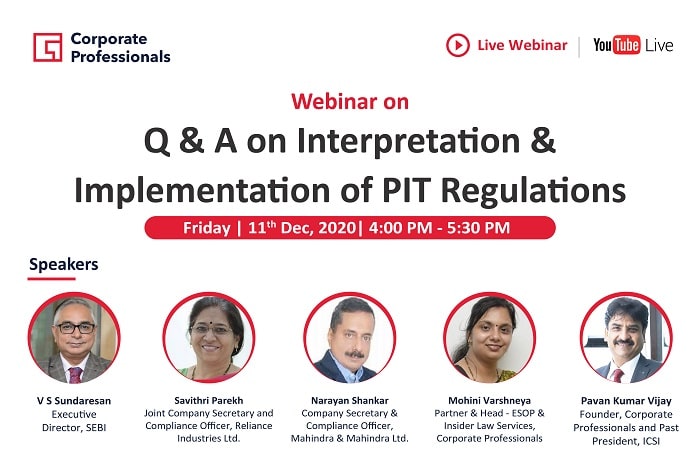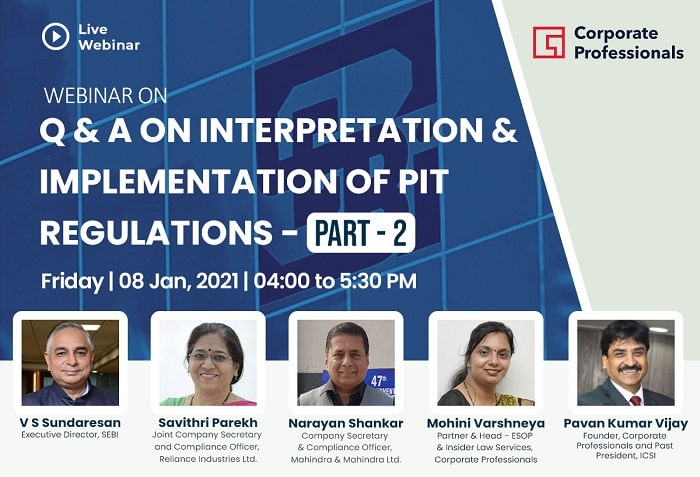Dear Friends,
Warm greetings from Corporate Professionals!
As a part of our knowledge sharing initiatives, we conducted two webinars on Q & A on Interpretation & Implementation of SEBI (Prohibition of Insider Trading) Regulations, 2015 (“SEBI Regulations”) in the months of January, 2021 and December, 2020.
We are happy to inform you that most of the questions received from our participants at the two webinars have been included in the FAQs on the PIT Regulations released by SEBI on April 29, 2021.
The said FAQs have been released with the objective of providing greater clarity on key aspects involved in the PIT Regulations. The FAQs are classified under various categories, namely, Trading, Structured Digital Database, Disclosures, Pledge, Trading Plan, Pre – Clearance, Trading Window Closure, Contra-trade, etc.
The FAQs now issued include all previous guidance notes and FAQs issued by SEBI till now.
Here are some of the key clarifications issued by SEBI:
1. Pledge of Securities:
1.1 The term Trading as defined under SEBI Regulations would include creation / invocation / revocation of pledge.
1.2 Market value on the date of pledge/revoke transaction should be considered for the purpose of disclosures under chapter III of the SEBI Regulations.
2. Trading when in possession of Unpublished Price Sensitive Information (“UPSI”):
2.1 Any Person who is in possession of Unpublished Price Sensitive Information (“UPSI”) will be termed as an Insider, irrespective of that Persons is classified as a Designated Person by the Company or not. As per Regulation 4(1) of the SEBI Regulations, an Insider is prohibited to trade while in possession of UPSI.
3. Structured Digital Database:
3.1 The requirement to maintain Structured Digital Database is applicable to Listed Companies, and Intermediaries and Fiduciaries who handle UPSI of a Listed Company in the course of business operations.
3.2 The Listed Company in its database shall record nature of UPSI shared, details of the Sender and Receiver (both Individual and Entity recipient) along with their PAN or other unique identifier (in case PAN is not available).
3.3 The Intermediary / Fiduciary in its database shall record nature of UPSI received/shared, details of the Company whose UPSI is received/shared details of individual Sender and Receiver along with their PAN or other unique identifier (in case PAN is not available).
3.4 Databases/servers provided by third party vendors whether within India or outside India will be considered as outsourced.
3.5 Records shall be updated in Structured Digital Database as and when the information gets transmitted (irrespective of the fact that information is shared within or outside the Company).
4. Trading Plan:
4.1 Trading as per Trading Plan can be done if in any case UPSI which was in existence at the time of formulation of such Plan has been made generally available. In case the UPSI is not generally available, then no trading shall be done.
4.2 If at the time of formulation of trading plan, there was no UPSI or later on a new UPSI was generated, then the trading can be carried out as per the trading plan, even if the new UPSI has not been made generally available.
5. Disclosures:
5.1 Upon filing of a disclosure under Regulation 7(2)(b) of SEBI Regulations, the disclosure of the incremental transactions after any disclosure shall be made when the transactions effected after the prior disclosure cross the threshold specified in Clause (a) of Sub-Regulation (2) of Regulation 7. Hence, the next disclosure will be due when the next Rs. 10 lacs limit is breached.
5.2 For filing of disclosures, the market rate of the trades shall be considered for calculating the threshold limit. The market price shall not be subtracted by subtracting Brokerage, Commission etc. i.e.net of taxes and all transaction charges.
5.3 The disclosure shall be filed irrespective of what the mode of acquisition is except for the shares acquired via bonus issue or received pursuant to a Scheme.
6. Pre – Clearance:
6.1 No Pre – Clearance shall be required for exercise of Options. However, for cashless exercise, Pre – Clearance shall be required because exercise of options and sale of shares acquired under ESOP are taking place simultaneously.
7. Trading Window:
7.1 When the Trading Window is closed, any earlier Pre – Clearance obtained when the Trading Window was open, would be invalid once the Trading Window is closed.
7.2 The Trading Window shall be closed when the Compliance Officer determines that a Designated Person or class of Designated Persons can reasonably be expected to have possession of UPSI.
8. Contra Trade:
8.1 Any Trading opted by a Person under Trading Plan can be done only to the extent and in the manner disclosed in the Plan accordingly Contra Trade provisions shall not be applicable in such cases.
8.2 The Contra Trade restrictions shall apply in case of subsequent sale of Shares (done within 6 months of acquisition) which were earlier acquired through rights issue / Further Public Offer.
8.3 Contra Trade restrictions would be applicable on collective basis on Designated person and their Immediate Relatives.
8.4 Contra trade restrictions are applicable on date wise and not on Share wise.
9. Designated Person and Immediate Relatives:
9.1 SEBI Regulations specifies that all Promoters of Listed Companies and Promoters who are Individuals or Investment Companies for Intermediaries or Fiduciaries shall be included as Designated Person. Further, if Promoter Group is having access to UPSI then the same shall also be included under the ambit of Designated Person.
Please click here, to view the full text of the FAQs


